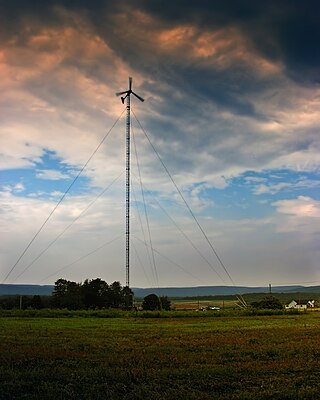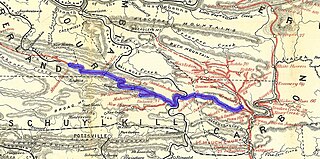
Schuylkill County is a county in the Commonwealth of Pennsylvania. It is located in the heart of Pennsylvania's Coal Region and is part of Northeastern Pennsylvania. As of the 2020 census, the population was 143,049. The county seat is Pottsville.

Mainville is a census-designated place in Columbia County, Pennsylvania, United States. It is part of Northeastern Pennsylvania. The population was 134 at the 2020 census. It is part of the Bloomsburg-Berwick micropolitan area.

Rush Township is a township in Schuylkill County, Pennsylvania, United States. The population was 3,423 at the 2020 census. The township is served by Tamaqua Area School District and Mahanoy Area School District.

The Union Canal was a towpath canal that existed in southeastern Pennsylvania in the United States during the 19th century. First proposed in 1690 to connect Philadelphia with the Susquehanna River, it ran approximately 82 mi from Middletown on the Susquehanna below Harrisburg to Reading on the Schuylkill River.

The Reading Company was a Philadelphia-headquartered railroad that provided passenger and freight transport in eastern Pennsylvania and neighboring states from 1924 until its acquisition by Conrail in 1976.

The Main Line of Public Works was a package of legislation passed by the Commonwealth of Pennsylvania in 1826 to establish a means of transporting freight between Philadelphia and Pittsburgh. It funded the construction of various long-proposed canal and road projects, mostly in southern Pennsylvania, that became a canal system and later added railroads. Built between 1826 and 1834, it established the Pennsylvania Canal System and the Allegheny Portage Railroad.

The Lehigh and Mahanoy Railroad, originally the Quakake Railroad, was a rail line connecting Black Creek Junction in the Lehigh Valley region of eastern Pennsylvania with Quakake, Delano, and Mount Carmel. Opened from Black Creek Junction to Quakake in 1858 and to Mount Carmel in 1860, it allowed anthracite coal mined along the line and bridge traffic to be transported east tos New York City. After 1866, it was merged into the Lehigh Valley Railroad and named Mahanoy Branch.
The Lehigh and New England Railroad was a Class I railroad located in Northeastern United States that acted as a bridge line. It was the second notable U.S. railroad to file for abandonment in its entirety after the New York, Ontario and Western Railway. It was headquartered in Philadelphia.

Catawissa Creek is a 41.8-mile-long (67.3 km) tributary of the Susquehanna River in east-central Pennsylvania in the United States. Its watershed has an area of 153 square miles (400 km2).

The Lycoming Valley Railroad is a short line that operates 38 miles (61 km) of track in Lycoming and Clinton counties in Pennsylvania in the United States. It is part of the North Shore Railroad System.

The Union County Industrial Railroad is a short line railroad that operates on approximately 12 miles (20 km) of track in Union County in the U.S. State of Pennsylvania. It is part of the North Shore Railroad System.

The Pennsylvania Canal, sometimes known as the Pennsylvania Canal system, was a complex system of transportation infrastructure improvements, including canals, dams, locks, tow paths, aqueducts, and viaducts. The canal was constructed and assembled over several decades beginning in 1824, the year of the first enabling act and budget items.

Roaring Creek is a tributary of the Susquehanna River in Columbia County and Montour County, in Pennsylvania, in the United States. It is slightly more than 20 miles (32 km) long and flows through Roaring Creek Township, Locust Township, Catawissa Township, Cleveland Township, and Franklin Township in Columbia County and Mayberry Township in Montour County. The watershed of the creek has an area of 87.3 square miles (226 km2). It has three named tributaries: South Branch Roaring Creek, Lick Run, and Mill Creek. The creek is not considered to be impaired and is not affected by coal mining. However, its watershed has been impacted by human land use. Claystones, conglomerates, sandstones, siltstones, and shales all occur within the watershed. The creek flows through a gorge in its lower reaches, along the border between Columbia County and Montour County.

Barnesville is an unincorporated community in Ryan Township, Pennsylvania, United States. Originally built to support nearby rust belt industries, the hamlet is between the center and eastern thirds of the Southern Anthracite Coal Region. The community is part of a wide-ranging township and is situated atop a summit and drainage divide flanked by two long climbs that are traversed by local transport infrastructure, railways with an important switching junction within the village, and Pennsylvania Route 54, which collects towns like beads on a string along a particular combination of connected valleys in the Ridge-and-Valley Appalachians.
The Lehigh Coal and Navigation Company (LCAN) (1988–2010) was a modern-day anthracite coal mining company headquartered in Pottsville, Pennsylvania. It acquired many properties and relaunched the Lehigh Coal Companies brand in 1988. The LCAN ran strip mining operations in the Panther Creek Valley east of Lansford, Pennsylvania along U.S. Route 209 with vast properties dominating the coal areas of Tamaqua, Coaldale, and Lansford.
The Little Schuylkill Navigation, Railroad and Coal Company (LSRR) was a railway company in the U.S. state of Pennsylvania in the 19th century. The main line ran from Port Clinton to Tamaqua, for a total of 28 miles (45 km).

The Nesquehoning Valley Railroad Company, herein called the Nesquehoning Valley Railroad (NVRR), is now a fallen flag standard-gauge, steam era shortline railroad built as a coal road to ship the Anthracite mined in the Southeastern Coal Region on either side of the Little Schuylkill River tributary Panther Creek and the history making coal towns of the Panther Creek Valley down the Lehigh River transportation corridor to the Eastern seaboard.

Catawissa Mountain is a mountain in Columbia County, Pennsylvania, in the United States. Its peak height is 1,873 feet (571 m) above sea level, making it the fifth-highest mountain in Columbia County. Streams that flow near the mountain include Roaring Creek, Catawissa Creek, and some of their tributaries. The mountain is near Nescopeck Mountain and Little Mountain. Sandstones and rock formations such as the Pocono Formation occur on Catawissa Mountain.















